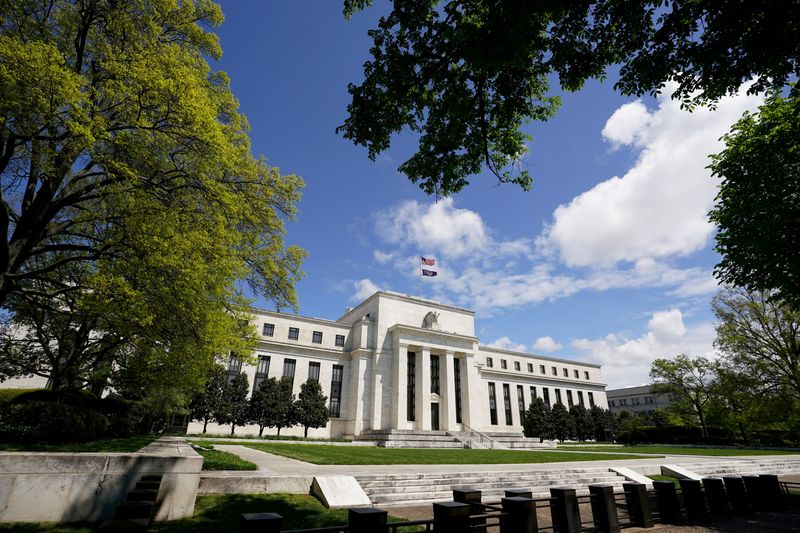By Davide Barbuscia
NEW YORK (Reuters) - U.S. Treasury yields climbed on Monday as investors remained concerned the Federal Reserve would maintain its ultra hawkish stance on fighting inflation despite economic data pointing to a slowdown in U.S. business activity in October.
The Fed is widely expected to increase rates by 75 basis points next week, but investors will be watching closely at any indication from policymakers of a less aggressive approach regarding future rate hikes.
"Their language on this issue will be very important with any softening in their tone likely boosting stocks and bonds and hurting the dollar or more hawkish language having the opposite effects," David Kelly, chief global strategist at JPMorgan (NYSE:JPM) Asset Management, said in a note on Monday.
The central bank has been shifting to a debate over how much higher it can safely push borrowing costs, with San Francisco Fed President Mary Daly saying on Friday it was time to start talking about "stepping down" from rate hikes.
Speculation about a potentially more dovish Fed - despite U.S. inflation remaining hot - was visible in money markets.
Fed funds futures traders on Monday were pricing in an almost 100% probability of a 75 bps hike next week and about a 50% probability of another 75 bps increase in December. A week ago, the chance of a 75 bps December hike was seen at over 65%, according to CME Group (NASDAQ:CME) data.
Still, Treasuries - where yields move inversely to prices - dropped on Monday, reversing earlier gains, as investors were sceptical about a significant change in the Fed's stance.
"There's been a little bit of optimism coming from equities as of late, so we have a maybe a little bit more of a risk-on sentiment," said Jake Jolly, Senior Investment Strategist at BNY Mellon (NYSE:BK) Investment Management. "But taking a step back, it's hard to see any material change and the macro outlook would suggest that things haven't changed much," he added.
Yields dropped after an S&P Global (NYSE:SPGI) survey on Monday which showed U.S. business activity contracted for a fourth straight month in October, with manufacturers and services firms reporting weaker client demand - the latest evidence of an economy softening in the face of high inflation and rising interest rates.
But they climbed back again, with the benchmark 10-year Treasury yields up at 4.229% and two-year note yields at 4.498%. On the long end, 30-year Treasury yields rose to an 11-year high of 4.359%.
"If the Fed is going to be data dependent, these data points should be a focus point for them. Whether or not that actually happens, is yet to be seen," said Matthew Miskin, co-chief investment strategist at John Hancock Investment Management.
"The Fed is probably going to end up causing a policy reversal, in time, but for now I think it is trying not to succumb to the weaker economic data," he said.
Uncertainty around the Fed's policies has been a major cause of wild price swings this year, with many participants complaining about deteriorating liquidity in the $24 trillion U.S. government debt market.
Treasury Secretary Janet Yellen on Monday acknowledged that liquidity had diminished due to increased volatility, but said it was not a source of financial instability.
October 24 Monday 3:00PM New York / 1900 GMT
Price Current Net
Yield % Change
(bps)
Three-month bills 3.9275 4.0198 0.028
Six-month bills 4.3525 4.5095 0.069
Two-year note 99-139/256 4.4982 0.007
Three-year note 99-68/256 4.5163 -0.017
Five-year note 98-254/256 4.3537 0.000
Seven-year note 97-122/256 4.2995 0.010
10-year note 88-56/256 4.2297 0.018
20-year bond 84-64/256 4.5942 0.024
30-year bond 77-112/256 4.3593 0.055
DOLLAR SWAP SPREADS
Last (bps) Net
Change
(bps)
U.S. 2-year dollar swap 36.50 -1.25
spread
U.S. 3-year dollar swap 10.75 0.50
spread
U.S. 5-year dollar swap 3.00 0.00
spread
U.S. 10-year dollar swap 0.25 -0.25
spread

U.S. 30-year dollar swap -49.75 -2.25
spread